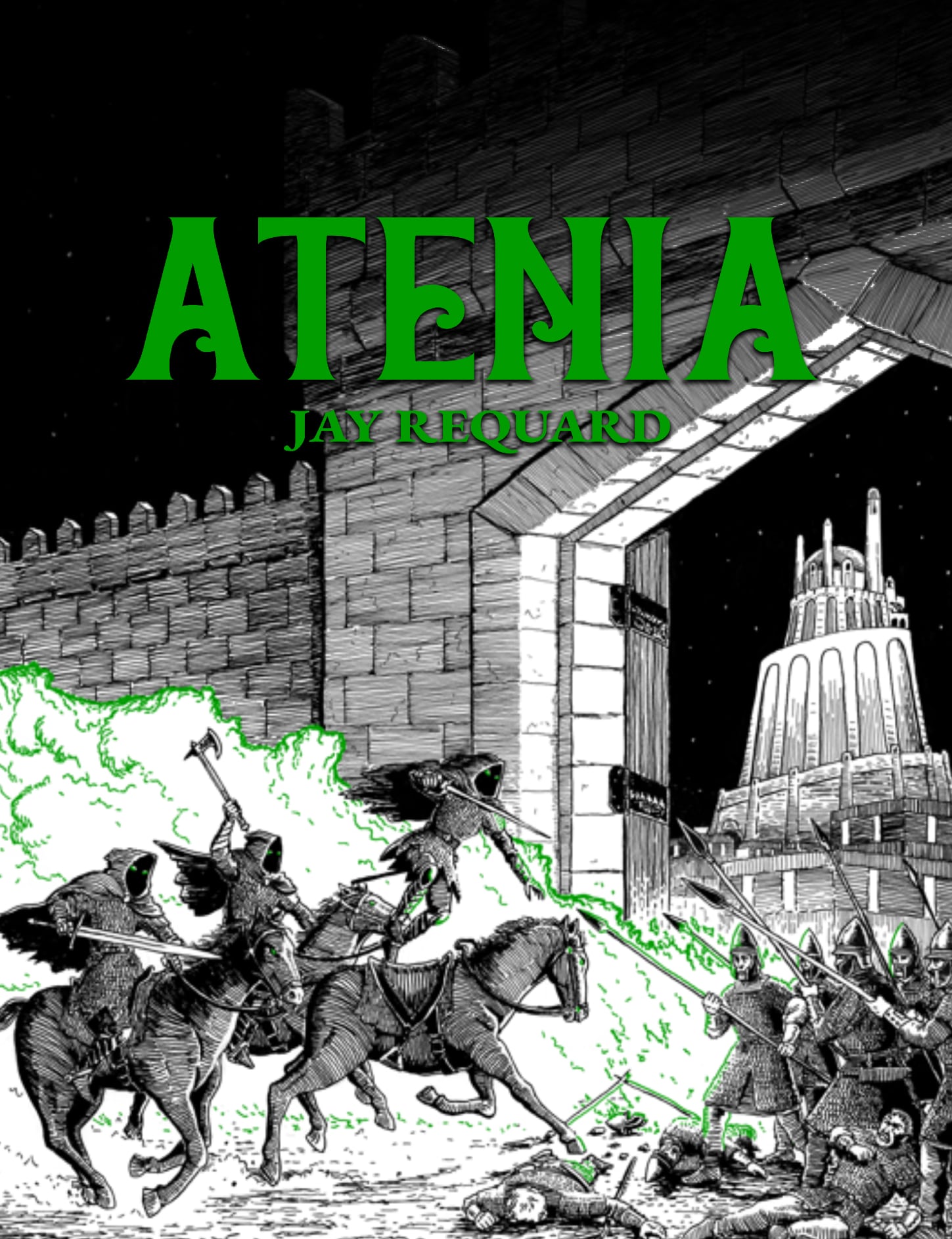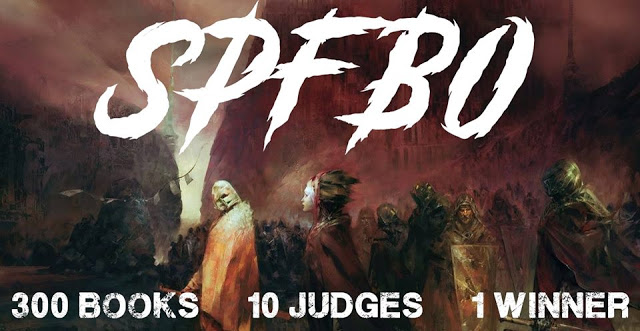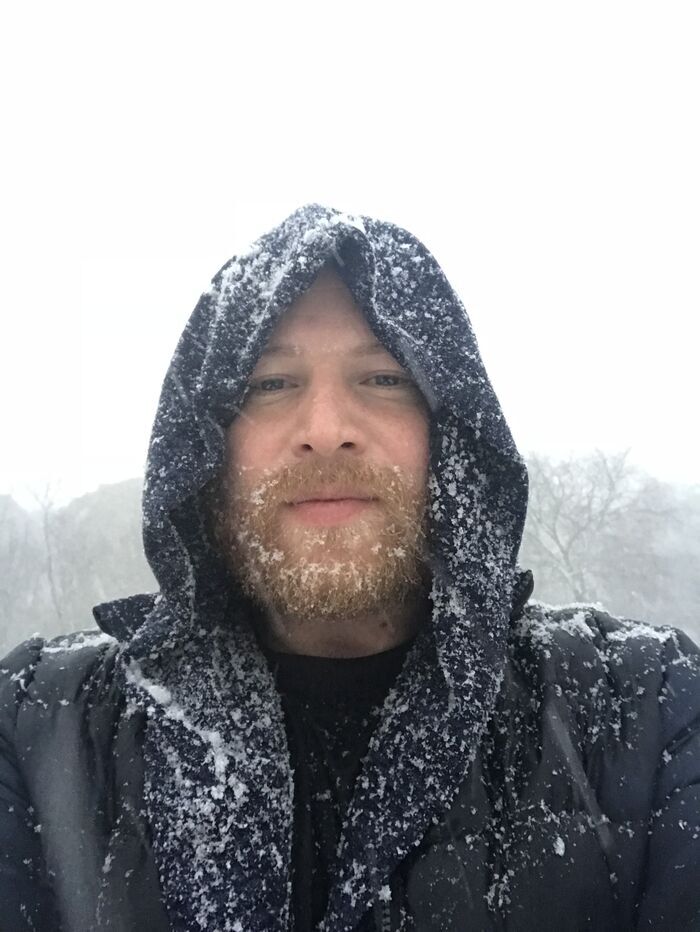Guard the Battlements! - Jay Requard
23 Sept 2023I want to thank Jam for allowing me space on his site to talk about my book Atenia while also waxing on Fantasy fiction, Indie vs. Traditional publishing, and some other things I think are important to note in 2023 versus other times. Without great reviewers and bloggers like him and so many more the Indie publishing community has no foundation. It is incredibly important that we give as much time and support as we can to sites like this one. It is easy to say, “share this post that features my book”, but if you really love the places where you go to find reviews on the books you’re dying to read, make sure to highlight those reviewers too!
Because of how important sites like Jam’s are for authors like me, I think I should discuss a little bit of who I am. My name is Jay Requard and I’m an Epic Fantasy and Sword & Sorcery author who has been publishing steadily since 2014. I have more than thirty short stories sold, as well as several novellas and collections published by traditional and independent publishers including Falstaff Books, Silver Blade, Swords and Sorcery Magazine, and Bards & Sages Quarterly. I also have my first Urban Fantasy series coming out in 2024 by Falstaff Books, which is called The Blessed & Possessed.
I helped establish Falstaff Books as one of the first authors it signed as well as serving as an editor and business manager before I moved onto other things in 2017. I also continue to work/struggle as a freelance editor and content creator, including a few stays at some publishers as a ghostwriter and developmental editor.
But Atenia is my debut novel, which I chose to independently publish under my own brand called Lookfar, and it will likely not be the last novel or series I publish on my own.

I slogged through the years of writing query letters (and still do), getting full requests for manuscripts (which still happens from time to time), and I’ve even turned down chances at representation because it didn’t fit with what I needed. I didn’t want to end up as another name on some agency’s list with an unsold book, or worse, a book sold to a place where I didn’t need an agent in the first place. I chose to publish my first novel, a standalone Epic Fantasy, because Indie Publishing both through self-publishing and the new breed of small publishers offer more opportunity and control over my intellectual property, as well as providing a safety net from the rapid changes that are occurring in the larger traditional venues, which the industry recognizes as the Big Four (Random House/Penguin, Hachette, Harper Collins, and though they may not be long for the world, Simon & Schuster.) I have heard arguments that Amazon should be considered as the new member of the old Big Five, but they’re complicated.
Having lived in both worlds now, I’ve observed some real misunderstandings the Indie publishing community has about traditional publishing and visa versa. I’ve also seen some interesting opinions recently involving the interaction of AI with the production cycle of books. Some of them are pretty easy to talk about without big exploration.
For example, I’ve been surprised to learn that Indie authors often mistake Traditional authors as having some sort of decision-making power over final aspects of their book before it hits the market, like their cover or the editorial. The truth is that Indie authors often have more say in what their work will look like on a shelf than what an author at a traditional publisher has save the writing and marketing of the book itself. The marketing aspect here is key, because despite what Indie authors may think, most traditional publishers (and authors) are terrible at a marketing. There are no secret “inside methods” to better sales that traditional authors have that Indie authors cannot access for themselves save the major literary awards and shelf space at major American retailers.
(But those aren’t what they are cracked up to be, which is an entire post within itself. Google “How the New York Times determines its bestseller list.”)
At the same time, I’m amazed at the sheer quality of great work there is out there from Indie authors that traditionally published authors, editors, and reviewers are foolish to look down on. I’ve managed slush piles and in the last year alone I have read multiple titles I would have bought and published in a heartbeat had they come through the submission window at Falstaff Books while I was there. The notion that some traditional authors, editors, and publishers continue to have about the quality of authors on the Indie scene is not only outright bogus, but reeks of an insecurity by a failing gatekeeper-class. There is immense talent between Indie and traditional authors that should be appreciated and enjoyed by all.
Many of these misconceptions come down to neither side really speaking to the other out of some age-old ideas that the traditional publishing business conditioned into us (especially trad authors) that are damaging and silly. At the same time, Indie authors need to have a certain amount of respect for the traditional venues that are actually successful and not see them as foes, but potential partners and allies in trying to push genre fiction forward.
And it can be done!
I came to realize this through the wonderful experience of Self-Publishing Fantasy Blog Off 9 organized by multi-time bestselling author Mark Lawrence of Prince of Thorns-fame. I entered my standalone Epic Fantasy novel Atenia into this year’s contest. While I did not write my book explicitly to participate in the fun, I did use the announcement of the 2023 iteration as a motivation to complete the manuscript and get it out there. I learned more about releasing a book in ways that I had not before, from finding cover art to buying ISBNs to paying for the editorial, layouts, and everything else that I had known about but never had direct experience in executing. At a traditional publisher someone does the editing (or many editors do various rounds of editorial depending on the manuscript), someone else makes sure your book gets assigned an ISBN, and someone else makes sure it looks good when presented on a page. Once you sign an agreement at a traditional publisher and turn your manuscript in, it’s no longer in your hands, but many.
And most importantly, someone at that traditional publishing house is signing a check you don’t have to get all of these things done so there’s an actual book. As an Indie author all of the responsibility to put out a great book is on me—but I also learned as many have before me that I could do it.

In addition, SPFBO 9 reawakened a joy I had lost. The traditional publishing community sometimes can feel very exclusive to people in a certain geographic vicinity, or a certain literary movement, or a socioeconomic agenda which overrides whether or not the story is actually any good. To my sincere happiness all I have found within the Indie genre community is unerring support, communication, and a solidarity that is often spoken in turn by traditional authors but rarely acted on. This was proven true in the scandal over Bob the Wizard by M.V. Prindle, where the author unknowingly commissioned work that contained elements of AI-generated art. While the debacle unfortunately ended the annual cover contest because Mark Lawrence rightfully can’t control this situation or the challenges artificial intelligence presents in the art spaces, the community around SPFBO was incredibly understanding, willing to listen to the author, and cheered them on when they did everything to make it right. Coming from a traditional publishing community where I once saw a Bahamian and queer YA-author get told they weren’t Black, Bahamian, or queer enough to own the voice of their work and subsequently lost their Big Five book deal because of it, it’s nice to see people give each other a break.
But while there are a lot of wonderful things going on right now, not everything is well. As much as traditional publishers continue to lose market share because of so many great authors and smaller publishers are putting out books independently, every author today is beleaguered by several difficult circumstances that will affect how readers find and receive our books in the future.
This is where I’d like to talk about Atenia for a moment. I wrote an Epic Fantasy standalone novel about a young woman seeking the truth over her father’s murder that has a lot of political themes to it like the brutal ease of letting those in power make the decisions vs. the messy difficulties of democracy and community, authority vs. assumption, and the phenomena of oppressed peoples returning to systems under the idea that “oh, if we just had the right people this time…” That book has no traction or draw for the traditional publisher, who values series even though at the highest echelons there’s no guarantee anymore an author will get their entire series published.
But what the Indie community and the marketplace shows is that those assumptions made by traditional publishing based on their eroding authority are basically wrong. Readers want to read and be left to decide what they like instead of being harped at or talked down to.
After all, aren’t the readers supposed to be the ones the industry, Indie or Traditional, serves first?
I would like to end with this—there are a lot of ways forward we can go that take readers, authors, and even publishers into a more positive direction. However we must make some agreements:
-We have to do something about AI as it pertains to intellectual property and authentic authorship. Too many books are coming out that are basically cobbled-together, poorly-edited digital Frankensteins that not only clutter the market but make it harder for readers to find great stories written by actual people with original ideas. Many of these books are made wholesale off the stolen works of Indie and Traditional authors alike. This is the pressing matter of our time and to surmount it we must do so together. We must have dialogue, organization, and more importantly, movement.
-We should treat traditional authors who are coming into the Indie scene better than we do now, and likewise, traditional authors should be doing more to look out for the Indie authors who make that step toward the Big Four publishing houses—those are hard places to get into and are changing rapidly, but they still afford greater distribution and give authors a chance to build a sustaining career. There are pitfalls those traditional authors of the past can help new authors navigate through. Those traditional authors who came before should act as emissaries, not competitors or critics, and should invest deeply in the Indie community in cultivating the new generation of bestsellers. Likewise, there are a lot of things traditional authors can learn from Indie authors in learning how to reach readers organically, how to participate in a larger community, and more importantly, foster a sense of that community among everyone—especially our LGBTQIA+ friends and family, BIPOC members, the disabled, and the neurodivergent.
-Invest in online and independent bookstores to combat the overreach of Amazon. It’s great that we have platforms like Ingram Spark and Draft2Digital to democratize the eBook sector, but one of the best things I’ve discovered and I’m working to do is get my print books listed at online and independent bookstores, especially those that curate their offerings and ship them like Silverstones Books, or The Broken Binding, who are modernizing into the digital age by pursuing new models and tools. Traditional and Indie authors alike benefit when there are more avenues and outlets to send their readers to other than Amazon, which while a great place to get discovered and make money, has a lot of undue influence because they have little to no actual competition. Authors of all walks working with independent and online booksellers can change this dynamic. Will it defeat Amazon? No, but that’s not the point—the point is to make the marketplace healthier, more vibrant, and more importantly, more diverse for authors and readers alike. This too will also allow independent and small publishers to grow in ways not experienced before in bookselling.
-Build and foster great
relationships with reviewers, book bloggers, and the Tubers/Tokers alike! There
is an entire new generation of young book reviewers and book pushers out there
on the internet and social media that are exciting, fun, and offering a lot of
great content to watch in general about books that we’ve never seen before. But
they only last if people keep watching them, like their work, and follow them.
Perhaps someone reading this is looking to get into book reviews through one of
their social media channels—if that’s the case, welcome! People like Jam, the Weatherwax Report, Indie Book Spotlight, Fantasy Book Critic, or even
up and comers like Katherine
D. Graham, Jim Wilbourne,
or Bearded
Darkness, are doing wonderful work that help push authors forward, help
readers find them, and foster a better industry that traditional publishing did
very little to keep up with or improve upon.
A concurrent mantra runs through those four points: there’s real opportunity here if we all work together.
Thank you so much for taking the time to read this post. Again I have to thank Jam for allowing me to come on and use his platform to promote my book, ATENIA, which entered into SPFBO 9 this year! If you like Epic Fantasy with high action and fun magic and politics that doesn’t beat you over the head I hope you will check it out HERE!
In addition if you sign up for my newsletter HERE you can get two of my books, the Sword & Sorcery novella WAR PIGS and my Sword & Sorcery short story collection, THIEF OF DESTINY!
Thank you, thank Jam, and as always, safe journeys wherever your adventure takes you.
About Jay Requard

Risen from the hills of North Carolina, Jay Requard is an award-winning fantasy author known for “heroes with genuine emotions and concerns for the word they live in” facing off against the darkest powers with little more than love, courage, steel, and magic to set things right. From the pulse- pounding heists of Thief of Destiny to the dark desert romance of Death & Dust and other tales of wonder, readers have noted his modern take on the genre feels like “diving into new hero mythology.”
After leaving the biomedical and legal industries, as well as helping to establish two independent genre publishers, Jay currently lives in New York City with his beautiful wife, a wonderful son, and a rambunctious shadow cat named Mona Underfoot. When not with his family or writing he enjoys meditating, reading, martial arts, cooking, and or course, wandering off for the next adventure.
